Good marketers are hungry for knowledge and always looking to hone their craft so they can win for their clients/brands/themselves.
We all start at the basics and no one should ever be made to feel bad for not knowing a tactic. It brings me so much joy to learn something new, and to empower a fellow marketer when I can.
That said, when someone is “faking” their prowess they invite ruin and ridicule on themselves (and often drag the brands they serve down with them).
I asked some of my favorite perspectives about their favorite marketing ”tells.”
Their answers turned into a really useful reality check on which tactics are still relevant and which ones need to be retired.

1. Leaning Heavily on Data with No Strategy/Action Items
This tell came up in all disciplines (SEO, PPC, and Social), but how it manifests itself varied depending on the practitioner.
In SEO, experts cited not being able to explain the “story” in data.
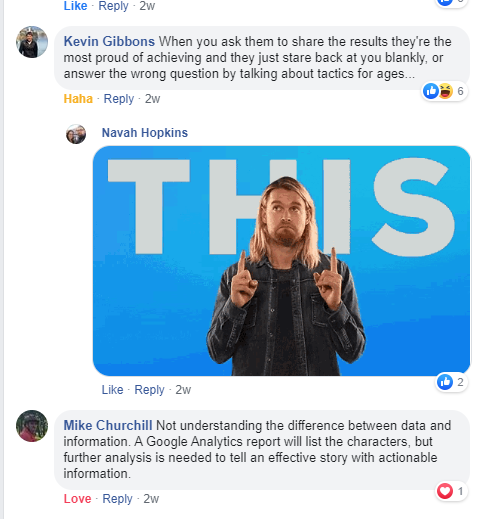
In PPC, talking “vanity” metrics over profit is a huge tell:

Data is a crucially important part of digital marketing.
Yet data can turn into noise the moment there isn’t a guiding strategy/perspective channeling it.
What separates a true expert from the bluffer is being able to distill data into actionable insights.
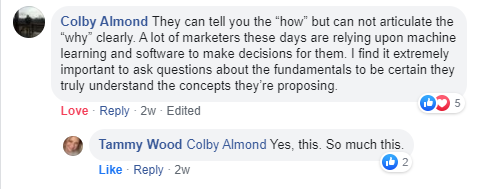
When it comes to clients, committing to hard metric outcomes can also be a tell. Rarely will a practitioner be able to predict an exact outcome, and that should be a red flag for any brand assessing an agency/hire.
Far more important is being able to achieve percentage growth, and be able to explain why.

If there is no context as to why the gains were made, successful campaigns could lose their budget because they didn’t receive proper attribution.

2. Over Compensating on a Single Discipline, Instead of Owning Holistic Point of View
Both PPC and SEO have long since become more than havens for one-trick ponies. The rise of integrated marketers empowers all of us to chase new frontiers, as opposed to staying where we’re comfortable.
Today’s brands are looking for well-rounded practitioners who can balance channel strategy with flawless execution.
While marketers may be tempted to over-specialize in a single discipline/tactic, they risk becoming a “dime a dozen” practitioner instead of a valued strategist.
Here are some of the SEO single tactics experts see as “one-trick”:
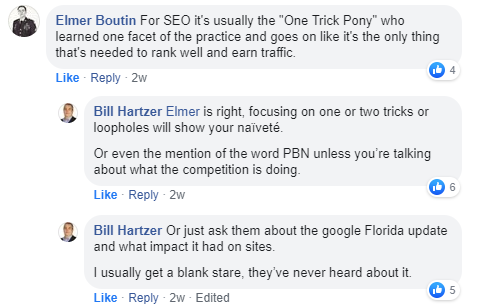
PPC doesn’t really have “one-trick” practitioners, but we do have practitioners who use one channel as a clutch.
- Just doing search.
- Just doing Facebook.
- Ignoring international.
On the flip-side, claiming to know everything about everything is a big tell for many.
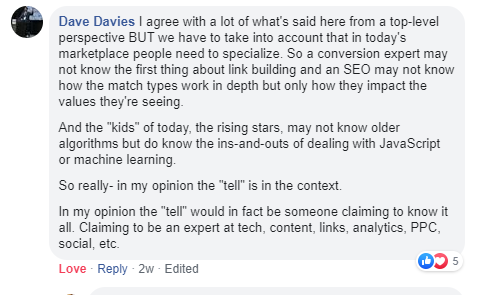
Striking the balance between future-proofing your career through integrated marketing and not alienating peers via ego-oriented claims is tough.
If you’re able to cultivate a branded perspective, peers, prospects, and brands will associate you with strategic chops instead of tasks they can delegate to interns/automation.
For example, my personal PPC perspective includes:
- Investing aggressively early, because I want a fast campaign ramp up and data to back all creative and targeting choices.
- I am a pragmatist at heart and will never let a non-branded search campaign run if it can’t get at least 10 clicks in the day.
- Blitzing via social/video/display to cultivate a proprietary list for search to close the deal on.
As you come up with your perspective, you’ll stop relying on specific channels as a crutch, and liberate yourself to test new and exciting platforms (TikTok, Quora, Waze, etc.).
3. Claiming to Be an Expert Instead of Proving It with Successful Campaigns
There are more lists of “Top ___ to Follow on ___” then I care to mention. While I proudly own my place as a Top 25 PPC Influential Expert, there is no denying there are many practitioners who are just as talented (if not more so) as I am.
The difference: I speak on a stage so my perspective gets taken more seriously.
What many don’t realize is the SEO/PPC personas who share insights on a stage don’t always do the work themselves.
The best influencer experts are those who build data sets and uncover trends based on the work they do – as I like to say, they “keep their teeth”.
While there is no harm in purely being a brand ambassador, pretending to be an expert without doing the work yourself sets you up to lose credibility with peers/the industry.
For example, “experts” who notoriously use ghostwriters:
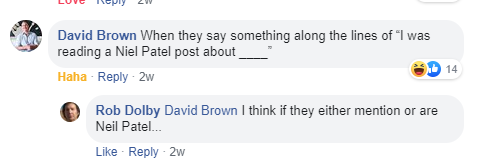 Main takeaway: understand there is a difference in technical and strategic skills between influencer marketing and technical PPC/SEO. If you are going to present work done by your team, cite that it came from your exceptionally clever team.
Main takeaway: understand there is a difference in technical and strategic skills between influencer marketing and technical PPC/SEO. If you are going to present work done by your team, cite that it came from your exceptionally clever team.
If you are a practitioner and have a unique perspective, lean in and pitch conferences/awards! The only difference between those on stage and those in the audience is the pitch.
4. Running Everything in Default
Default settings are safe “average” gateways to getting campaigns off the ground, but are rarely long term winners.
In paid campaigns, this can mean:
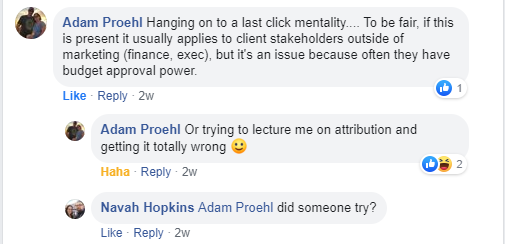
- Last click attribution.
- Everything on broad match.
- Targeting the whole domestic country (influenced by the settings chosen when you first set up the account).
In SEO, there aren’t really defaults, but there are data points/tools without context:

- Ranking #1 for low value SERPs.
- Increase in sessions without looking at time on site or bounce rate.
- Only relying on content without any technical to back it up.

The problem with defaults is they don’t account for human intelligence or business acumen.
While it’s true some performance gains can happen with these settings, they are inevitably happenstance.
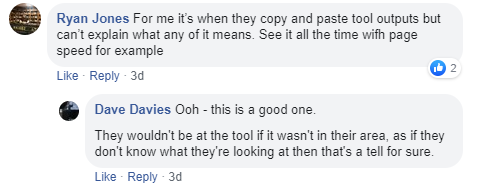
It’s important to note there is no “right” answer on how to run accounts, and any practitioner who tries to claim they have all the answers, is absolutely bluffing.
5. Blindly Accepting a Tactic Without Assessing Its Viability Because an ‘Expert’ Said It
Experts, gurus, ninjas, and any other variety of “seasoned” voice can be very alluring.
In theory, they know what they’re saying/doing, and citing their work/following their example should be a surefire way to marketing prowess.
Not all experts are created equally.
Some, will intentionally share an old trick just to see if you know to challenge it:
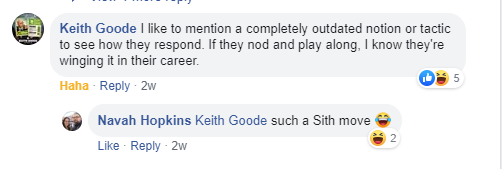
There is no “single source for truth” on how to run accounts and what makes for a winning strategy.
It’s important to test all ideas, and allow for exceptions to rules.
Clinging to the same strategies one learned 10 years ago just doesn’t work in this fast-paced industry.
While Goode’s tactic leans a tad heavily on the mischief, the heart of it is sound: auto-pilot strategy sets you up to be replaced by a machine.
If a tactic seems off, challenge it (politely).
My favorite moments at conferences are clever Q&A where we can dive into the specific applications of a strategy.
Others, while brilliant, have relinquished some of their technical teeth because they’ve evolved into strategy-first forces for good:
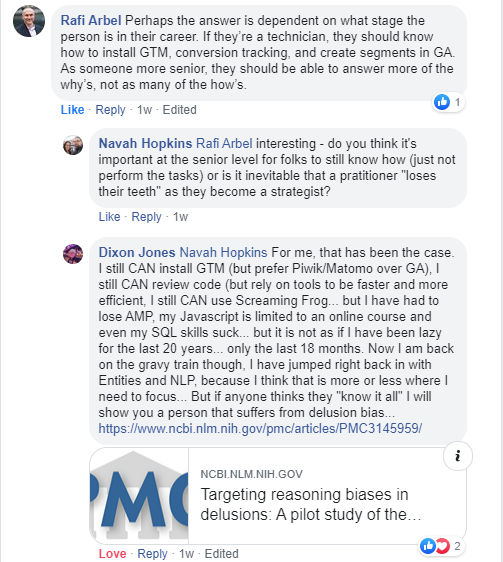
True hybrid strategist/technicians are rare.
The “average” expert is a technician turned strategist because they’ve gotten to a point in their career where it’s more cost-effective to delegate the work to their team.
Sometimes strategies that work across most brands may not mechanically make sense for yours.
Experts who have delegated their technical chops will be great sources for ideas, not necessarily verbatim prescriptions.
As you assess strategies to implement, think critically and pragmatically as to whether they make sense to adopt.
Final Takeaways
While the intricacies of these tells differs when we’re discussing SEO, influencer marketing, or PPC, the core themes remain the same:
- Data is an incredibly useful tool, but is only as impactful as the story it fuels.
- Defaults and one-trick ponies are excusable as a novice, but as you grow in this industry, clients/peers will expect you to evolve beyond them.
- Industry speakers/bloggers have the benefit of perception – if a strategy suggested doesn’t quite fit your needs, don’t feel peer pressured to adopt it.
More Resources:
- 10 Reasons You Can’t Be Afraid to Experiment & Fail with Your Content
- 4 Things No One Tells You When You Start Your Own Marketing Business
- Why Content ‘Tactics’ Fail You & How to Become Relevant
Image Credits
All screenshots taken by author, November 2019





![AI Overviews: We Reverse-Engineered Them So You Don't Have To [+ What You Need To Do Next]](https://www.searchenginejournal.com/wp-content/uploads/2025/04/sidebar1x-455.png)